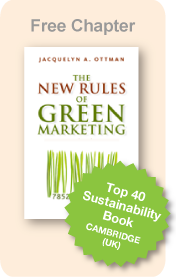Jacquie Ottman's
Green Marketing Blog
Apples Versus Oranges: To Compare or Not?
October 14, 2008 by Jacquelyn Ottman
I received an email this morning from a frantic manufacturer of laptops: "We need to finalize a green marketing claim for an ad we're preparing. Our laptops use less energy than desktop computers. Should we make the claim? Help! We don't want to be accused of greenwash!" (Note: Company name not included and category has been changed for confidentiality - but you'll get my points!)
On the surface a comparative green marketing claim such as this one looks pretty innocuous. However, dig a little deeper and you find some issues.
There are two of them: one related to comparing "apples to oranges", the other: are you telling the whole story?
On apples to oranges, laptops versus desktops. Are the desktops they are comparing the laptops to one-for-one substitutes, e.g., comparable machines? If not they could be faulted for comparing a teeny laptop with a big lunky desktop machine. (I suspect they are for different markets and different uses, so it might be a little tricky greenwash-wise.)
Note that the company wants to compare energy in use. However, the fairer comparison for good green marketing is energy consumed over the total life cycle of the products. (You may have heard stories about CFLs consuming a lot of energy in their manufacture - that's why they are so much bulkier than incandescents- it compromises some of the total energy savings over their total life cycle.) So in comparing laptops versus desktops, does one type of machine actually use more electricity to manufacture or ship? In this case, if the laptops use more energy to manufacture or ship, then a comparison claim is compromised since net net, the laptops on balance may consume more energy-hence better to compare laptops to laptops.
Are you comparing your own laptop computer to competitive desktops? All desktops? Probably need to be clear.
To put it conservatively, I think one's best bet is to compare one's laptop only to one's own prior performance - i.e., show consumers that YOU are working hard to do better yourselves. Then, next best thing is to compare laptop to laptop so it's easier for consumers to compare. And if you really want to be authentic-and avoid greenwash-be sure to incorporate total energy consumed throughout the product lifecycle, lest someone fault you for making energy use claims but then find that you're shipping the machines from a much farther place than competitors (or a previous generation of machines).
This is a tricky situation, but more common than you think in the world of green marketing. Please, let me know what you think. What are some challenging claims you've been forced to grapple with?
Jacquelyn A. Ottman
President, J. Ottman Consulting
Click here to join our mailing list.



 ShareThis
ShareThis

